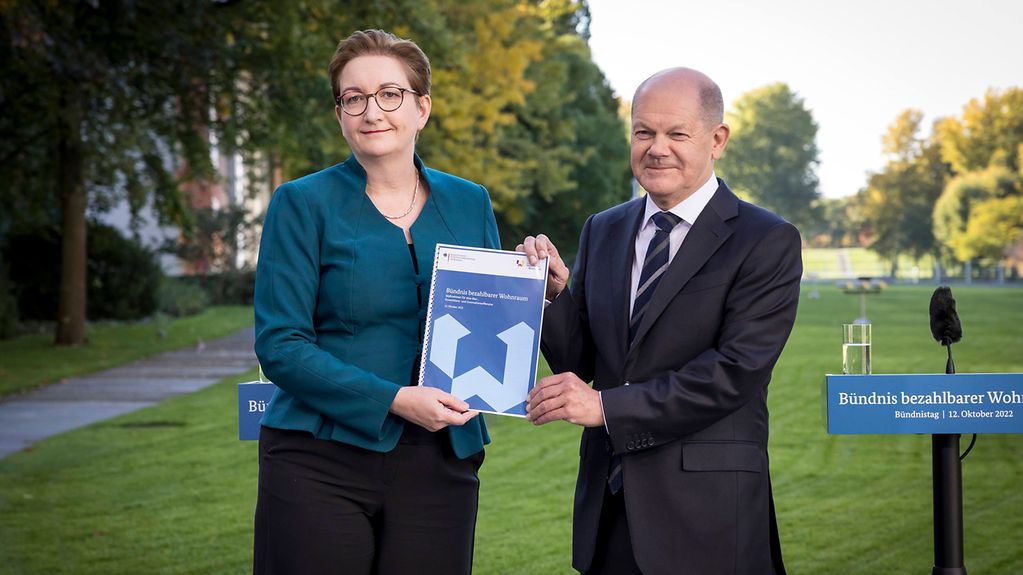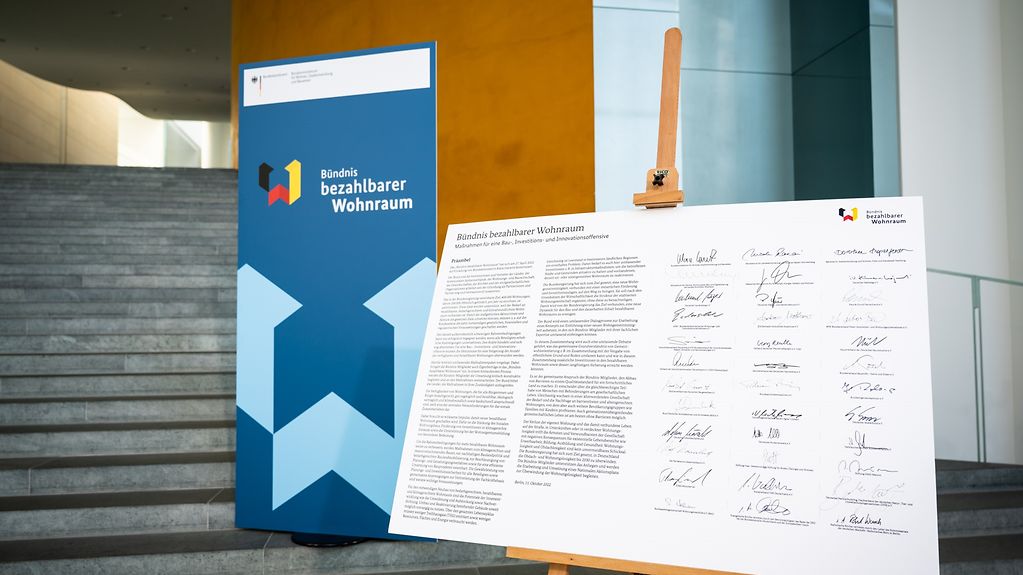Alliance for Affordable Housing (Bündnis für bezahlbares Wohnen)
The Federal Government and the Alliance for Affordable Housing have agreed on almost 200 specific measures for a new construction campaign, with a view to building 400,000 new homes per year regardless of the prevailing difficult economic conditions. Federal Chancellor Olaf Scholz, also added that it was important to limit ancillary costs in spite of the current high energy prices.
4 min reading time

Federal Minister for Housing, Urban Development and Building Geywitz presented the package of measures to Federal Chancellor Scholz.
Photo: Federal Government/Steins
The Federal Government wants to construct a sufficient amount of affordable, climate-neutral, and low barrier housing. The Affordable Housing Alliance’s 190 proposed measures are intended to give a major boost to the construction of new housing in Germany.
Scholz said that the goal is to build 400,000 flats in Germany per year, 100,000 of which will be subsidised through social funding. "We want to make it clear that we are committed to achieving our stated goals," said Scholz at the first Alliance Day at which a comprehensive package of measures for a construction investment and innovation campaign was presented. "Our goal is to increase the number of domestic housing units to this level," Scholz said, adding that he is well aware of the effort it would take to achieve the ambitious housing targets. The Federal Chancellor said that the conditions for the construction industry had become even more difficult following the Russian war of aggression in Ukraine, which is why the Federal Government is putting a protective economic shield in place to ensure that energy and housing remain affordable.
The Protective Shield, Scholz explained, would make up to 200 billion euros available to cushion the consequences of high prices for consumers and businesses. The Federal Government, he continued, has introduced an electricity price brake, and is working intensively on ways to keep gas prices down: the additional cash of almost 100 billion euros would already ease the burden on ordinary members of the public and businesses.
The housing issue "a major challenge for society as a whole"
Many members of the public already have to spend half of their income on housing costs and many young people are desperately trying to find a place to live. This is why the Federal Chancellor described the housing issue as "a major challenge for society as a whole." The coalition partners had formulated a concrete roadmap with this package of measures and Scholz pledged that the situation would be reviewed once a year in order to ensure that progress continues in this area.
Around 190 specific measures agreed
To achieve this, Scholz said, the Federal Government had created a dedicated Ministry of Construction and brought representatives of all the necessary trades together around one table in the Alliance for Affordable Housing (Bündnis für bezahlbares Wohnen).
As the Federal Minister for Housing, Urban Development and Building, Klara Geywitz, explained, the 35 alliance partners have worked intensively to develop the 187 specific measures for more affordable housing over the past six months, each of which has been given a specific deadline.

All significant stakeholders in the domestic housing construction industry are represented in the Alliance for Affordable Housing.
Photo: Federal Government/Steins
The Federal Government will be investing 14.5 billion euros in the construction of social housing
By 2026, the Federal Government will have increased its social housing subsidies to a record 14.5 billion euros, Scholz said, which will provide massive support for the Länder. Yet, he said, the Länder also need to step up their efforts to provide more socially subsidised housing in the future. 100,000 of the 400,000 new flats per year are to be constructed as social housing.
Housing for the young, support for home ownership, and the new housing community benefit system
Geywitz said that the Federal Government would also be launching a housing programme for young people, as well as a new, attractive home ownership programme for young families in early 2023. She also committed an increase in the linear tax subsidy for residential buildings is to from two to three percent as of 1 July 2023.
One of the measures the Federal Government is planning to introduce is a new subsidised non-profit social housing scheme, Geywitz added.
Faster planning in addition to more and cost-effective construction
The key to building more housing, Scholz said, is to use more rapid and cost-effective construction methods, to which end, state building codes will also be amended. One of the measures agreed upon is that in the future, once housing type approvals have been granted, they will be valid throughout the country, which will ensure the wider use of serial and modular construction.
Computer-based approaches could facilitate and accelerate planning and construction. The new Federal Government portal for "Building Information Modelling" can be used free of charge by anyone involved in the construction industry to ensure consistent data sharing. The Federal Chancellor indicated that the portal would be expanded in future. The alliance partners are also planning to create the so-called "digital town hall door", which will make it possible to submit computer generated planning and project applications to the responsible authorities everywhere. There are also plans to make online building applications possible throughout the country.
Climate-friendly and affordable construction
To promote climate protection and affordable housing, he said, the Federal Government will be providing support for measures that go beyond the statutory energy standards for new buildings to which end the new funding programme, which is currently being prepared, will provide a billion euros starting in 2023.
The plan is to focus the new "climate-friendly construction funding programme" more closely on the life cycle of buildings, with a view to reducing greenhouse gas emissions as well as cutting the resources, land, and energy used from first construction to final demolition. A new digital building resource passport for new buildings will be introduced to encourage the reuse of products used in construction.